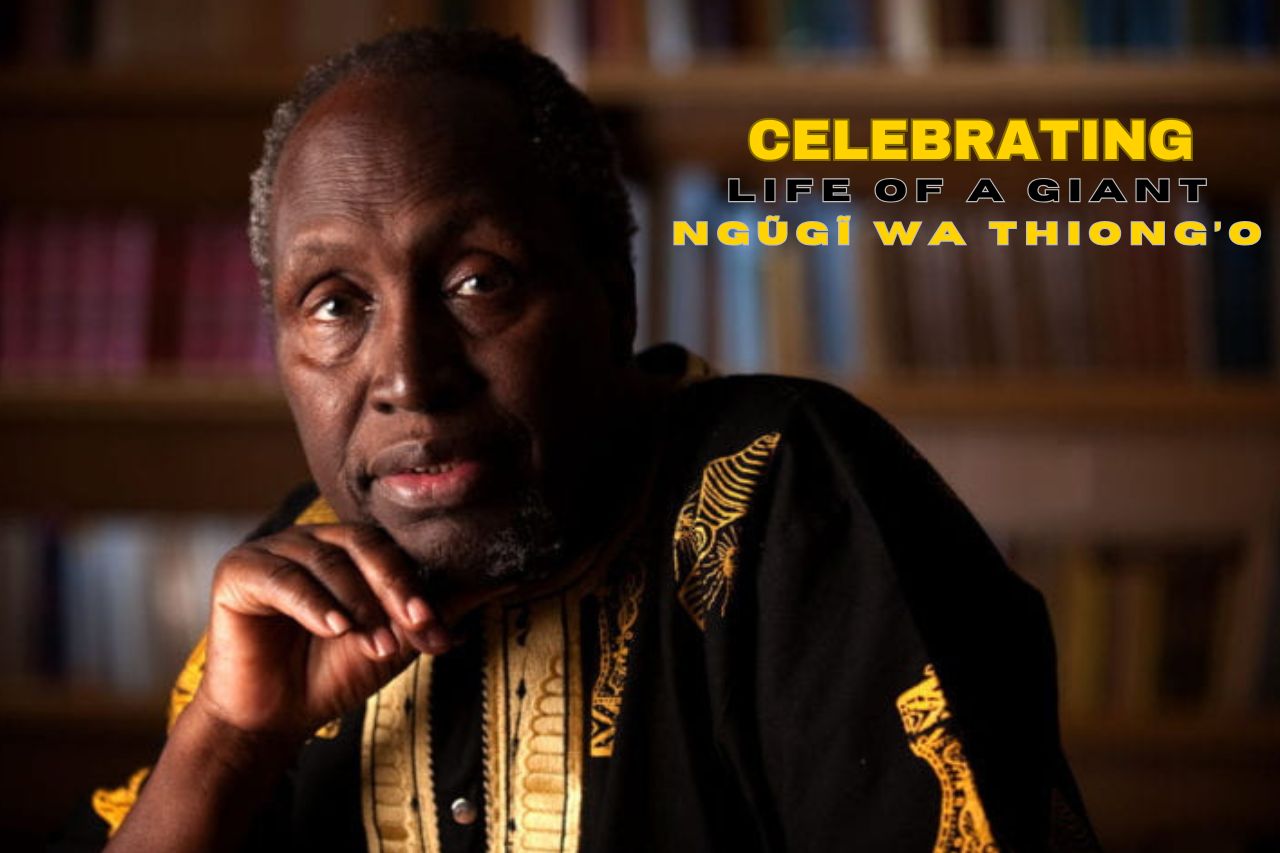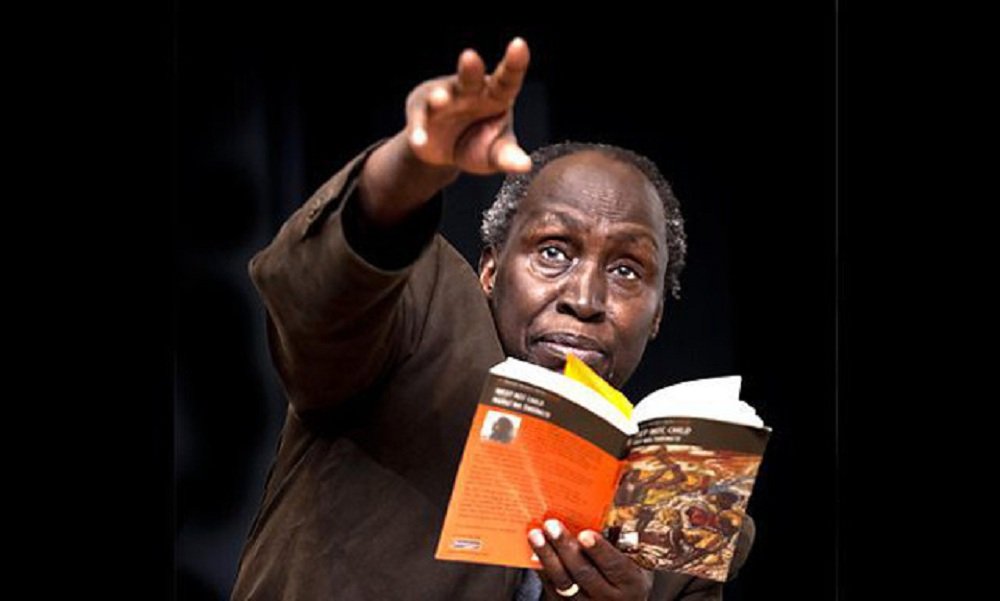
Ngũgĩ wa Thiong’o
The world is mourning the loss of Professor Ngũgĩ wa Thiong’o, the iconic Kenyan writer, academic, and revolutionary thinker, who passed away on May 28, 2025, in the United States at the age of 87.
Known for his uncompromising stance on African identity, language, and liberation. Ngũgĩ’s legacy remains etched in the hearts of generations across the globe.
Ngũgĩ wa Thiong’o’s Final Days and Cause of Death
Ngũgĩ wa Thiong’o died peacefully in his sleep following a prolonged illness. News of his death was confirmed by his daughter, Njeeri wa Ngugi.
She highlighted that the celebrated writer had been under medical care in California, where he lived. His death marks the end of an era in African literature, with tributes pouring in from political leaders, fellow writers, and students of literature.
President William Ruto led the nation in mourning, describing Ngũgĩ:
“I have learnt with sadness about the death of Kenya’s beloved teacher, writer, playwright, and public intellectual, Prof Ngugi wa Thiong’o. The towering giant of Kenyan letters has put down his pen for the final time. Always courageous, he made an indelible impact on how we think about our independence, social justice as well as the uses and abuses of political and economic power. In his bold and creative career, Prof Thiong’o showed us how to make contributions that cannot be ignored and speak in ways that both supporters and opponents cannot ignore…”
Is Ngũgĩ wa Thiong’o Still Alive? The Answer Is Now Clear
Until recently, the question “Is Ngũgĩ wa Thiong’o still alive?” trended frequently, with admirers keeping up with the aging scholar’s health. With his passing confirmed, readers are reflecting on his monumental contributions to literature, activism, and education.
A Literary Journey Rooted in Resistance
Born on January 5, 1938, in Kamirithu, Limuru, Ngũgĩ wa Thiong’o was originally named James Ngugi. He later rejected his Christian colonial name in favor of a native Kikuyu identity, becoming a powerful voice against colonial and post-colonial oppression.
His first major works, such as “Weep Not, Child” (1964), “The River Between” (1965), and “A Grain of Wheat” (1967), launched his reputation as East Africa’s leading novelist. These novels explored themes of colonial resistance, identity crisis, and social injustice, making them staples in African literature classrooms.
Ngũgĩ’s 1977 masterpiece, “Petals of Blood,” was a searing critique of neocolonial Kenya, and led to his imprisonment by the government of Daniel arap Moi. It was during his imprisonment in Kamiti Maximum Security Prison that he wrote “Devil on the Cross” famously composed on toilet paper using a smuggled pen.
Why He Left Kenya: Exile and Global Impact
After facing threats due to his writings and activism, Ngũgĩ went into exile in 1982. He taught in various universities, including Yale, NYU, and UC Irvine, where he served as Distinguished Professor of English and Comparative Literature.
From abroad, he continued to write and advocate for African languages and cultural decolonization, most notably through his groundbreaking essay collection “Decolonising the Mind” (1986), which argued for writing in African languages as an act of resistance and liberation.
Ngũgĩ’s Books and Enduring Legacy
Books by Ngũgĩ wa Thiong’o have been translated into more than 30 languages, and his works continue to be read widely in Africa and beyond. Key titles include:
- Weep Not, Child
- The River Between
- A Grain of Wheat
- Petals of Blood
- Devil on the Cross
- Matigari
- Wizard of the Crow
- The Trial of Dedan Kimathi (co-written with Micere Githae Mugo)
- Dreams in a Time of War (memoir)
- Birth of a Dream Weaver (memoir)
His novels not only chronicled Kenya’s historical journey but also offered blueprints for intellectual resistance across the continent.
The Personal Life of Ngũgĩ wa Thiong’o: Wife and Divorce
Ngũgĩ was married to Njeeri wa Ngugi, an academic and activist. The couple survived a brutal attack in Kenya in 2004 that left Njeeri seriously injured. The incident exposed lingering threats to Ngũgĩ’s life back home and rekindled discussions about the risks faced by outspoken critics.
The couple later divorced quietly, but remained connected through their shared children and literary legacy. Ngũgĩ fathered several children, including Mũkoma wa Ngũgĩ, a poet and literature professor, and Wanjikũ wa Ngũgĩ, also a writer.
Did Ngũgĩ Win the Nobel Prize?

Though he never won the Nobel Prize for Literature, Ngũgĩ wa Thiong’o was often mentioned as a frontrunner. Literary circles long debated why the Kenyan legend was overlooked. Many argued that his radical stance on African languages and anti-imperial narratives challenged the Western literary canon too boldly for Nobel recognition.
Nonetheless, he won numerous international awards, including the Nonino International Prize for Literature, the Park Kyong-ni Prize, and honorary doctorates from universities around the world.
Ngũgĩ’s Influence on African Literature and Education
Ngũgĩ was more than an author. He was an educator, philosopher, and cultural reformer. His push for African languages to be taken seriously in literature inspired a wave of writers to break from colonial tongues.
He was a mentor and symbol for African intellectuals, a man who, despite the trauma of prison and exile, remained committed to pan-African progress. His rejection of English as a primary literary language remains a deeply influential and controversial stance even today.
Ngũgĩ’s Connection to Chinua Achebe and African Storytelling
Often compared to Chinua Achebe, author of Things Fall Apart, Ngũgĩ shared with Achebe a commitment to restoring African dignity through storytelling. However, Ngũgĩ went further by completely switching to Gikuyu in his writing, which Achebe did not. Their mutual respect, however, was well-known.
Farewell to a Revolutionary Pen
Ngũgĩ wa Thiong’o’s death leaves an irreplaceable gap in global literature. Yet his writings, speeches, and uncompromising spirit remain alive through generations of readers and thinkers. From Kamirithu village to the global literary stage, Ngũgĩ’s journey is a testament to the power of words in shaping history.
As the world bids farewell, literary communities prepare to commemorate his life with book readings, academic symposiums, and reissues of his most powerful works.
Final Thoughts
Ngũgĩ wa Thiong’o’s pen never feared power. His words inspired revolutions of the mind and spirit. As we reflect on his passing, let us remember the man who dared to dream of an Africa that writes itself into the future boldly, in its own voice.
Rest in Power, Prof. Ngũgĩ.





